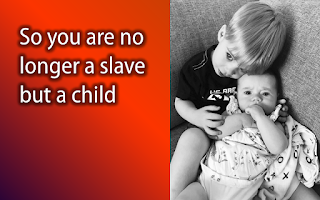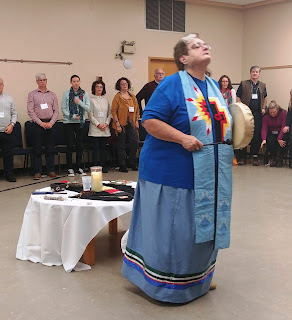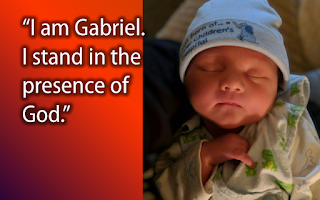Hespeler, 28 October, 2018 © Scott McAndless – Baptism
Galatians 3:23-4:7, Psalm 78:1-8, Mark 9:33-37
ne day, when his disciples were being kind of awful with each other – when they were arguing and fighting with each other because this one thought that he knew exactly how things ought to be done and was frustrated that no one else would listen to him and that one thought that the other guy over there wasn’t giving him the respect he deserved and then there was this other one who totally hated all of the songs that the other guys would sing when they walked down the road – anyways I don’t really want to get into it but they were being kind of typical for them honestly and so Jesus decided to do something that would help them to see what was really important about what it was that they were doing together.

So this is what Jesus did. He said to the disciples, hang on for a minute guys because I need to show you something. And he went over to a place by the side of the road where there were some women sitting and talking together and they were holding their babies. And Jesus said to one of them, “Please, ma’am, could I borrow your beautiful child for but a moment? In fact, if you would share her with me it would really help me to set these disciples of mine straight.”
The mother looked at Jesus for a moment and decided that he looked trustworthy enough and she let him take the child gently into his arms. And then Jesus carried that child back to the circle of disciples and sat down in their midst with the child upon his knees and said to them, “Guys, do you see this here? This is what it is all about.”
And I kind of feel that that is what Jesus has done for us today. Jesus spoke to Mark and to Dina and he said to them, “Say, would you bring your two beautiful children, Jackson and Amelia, and would you share them with my church in Hespeler for about an hour today? And, praise God, Mark and Dina said yes.
I know that they think that they brought their children here in order that they might be baptized today. And indeed they did. But I have no question that Jesus also had an ulterior motive and making sure they can come here today. Jesus wanted to make sure they came here so that they might teach the gospel, the good news, to us.
So, if Jesus has gone to all that trouble to communicate with us today, I think that we ought to listen. But we are kind of in the position that those disciples were in on that day when Jesus plunked a child down in their midst. They probably looked at each other and shrugged and said, “I don’t think I get it.” And the message may not be so obvious to us either. So let me suggest we turn to the Apostle Paul, that explainer of all things, because he may be able to help us.
In our reading this morning from his letter to the Galatians, Paul is speaking to a church that is struggling with the same kind of problems that the disciples were having on that walk with Jesus. They were trying to figure out who should be in charge of the church and how things should be done. They were arguing over whose concerns were more important and whose were less. And Paul, in this letter, does the same thing for them that Jesus did for the disciples; he invites them to consider some children.
The thing is, though, that most of what Paul says is expressed in terms of the normal child-rearing practices of that time and we can’t quite relate to those things. For example, in Paul’s time, children were often raised by a slave who was called a disciplinarian and who was given the authority to actually beat the children, so Paul talks about how children had to deal with that figure in their lives. There were also some pretty strict regulations about inheritance and Paul makes reference to those. But, as I say, those things don’t really have much to do with our experience so I don’t want to get into explaining them.
Nevertheless, the overall point that Paul is making is really important and helpful to us so I wanted to try and find a different way to approach it. So, rather than talking about what ancient children had to live through, let me do what Jesus did and invite you to consider the child or children in front of you. Let’s consider what Jackson and Amelia can teach us about the good news of Jesus Christ.
Jackson and Amelia are very young and yet they are Canadian citizens. They are free citizens of a democratic society with all of the rights and privileges that come with such citizenship. We have also welcomed them today into the Church of Jesus Christ through the sacrament of baptism and they have full rights and responsibilities within the church should they choose to exercise them. Nevertheless, over the next few years, how much freedom will Jackson and Amelia practically enjoy? Not a lot. I am pretty sure that there are going to be rules, lots of rules, that they have to live by. There will be rules like, “Hold my hand when you cross the street,” “Brush your teeth before you go to bed,” and, “Never, never, never touch a hot stove.”
Why will those rules be there? They will be there because their parents love them and don’t want bad things happen to them – things like tooth decay and burnt fingers.” Those rules will come out of love, but will the children always hear them that way? If they are like most children, probably not. Most children don’t really like rules, probably because they often feel arbitrary and they don’t understand that they are coming from love. But the idea is that, as these children grow up, they will begin to look beyond the rules and understand the love behind them and internalize the reasons for the rules in productive ways.
Of course, it doesn’t always quite work out like that. Sometimes children never understand the purpose behind the rules and instead just slavishly continue to follow them without understanding. Let me give you an example I heard about recently. One thing that sociologists have been noticing about young people coming of age in recent years in our society is that many of them seem to have an irrational fear of handling raw meat. They almost can’t touch it. This is something that can certainly get in the way of mature adults learning to cook for themselves! As a result, researchers are actually working on developing packaging for meat that eliminates the need to actually touch the meat to cook it. But where did this irrational fear come from?
It comes from the rules were given to them as young children. It is a good rule to not allow small children to handle raw meat because the danger that they will get bacteria in their mouths or noses is too great. It is a good rule for a small child not to handle raw meat, but as that child grows older that rule is supposed to pass away as they learn to understand what the actual dangers of raw meat are and how to safely deal with those dangers. That learning sets them free from the old rules to explore their freedom by cooking many different things. But if the child doesn’t grow beyond the simple rule-based understanding, they will never know that freedom and that is what seems to be happening.
And, as it is with that one particular rule, so it is with many of the rules that we grew up with. The point behind them is not simple obedience. The point is to understand their purpose in the love that is behind them. This is something that the Apostle Paul clearly understood when he said, “Love is the fulfillment of the law.” (Romans 13:10) This is something that these children will have to learn as they mature to adulthood or they will never know the true freedom that they were born to inherit. They will simply be slaves to obedience.
Another thing that sometimes happens with children as they grow older is that they may become confused about why their parents love them. Now, I have absolutely no doubt that Jackson and Amelia’s parents love them because they love them. They don’t love them based on how well they follow the various rules of the household. But sometimes that message gets confused and children start to think that they can only earn their parents’ love and approval by obedience and by living up to their parents’ expectations.
This also is a misunderstanding of the purpose of the rules. And, unfortunately, many adults carry that misunderstanding with them all through their lives. They continue to think that they must earn love, approval and meaning by how well they live up to the expectations of others. They often especially assume this in their relationship with God. This error also leads to unnecessary and often debilitating guilt when we feel like we don’t measure up.
Does that teach us something about our Christian lives? Absolutely! The Bible is just full of laws, rules and commandments. This is true both of the Old Testament and New. These are all expectations that are placed upon us. And it is quite possible, indeed, I would say very common, for Christians to become fixed upon those expectations and to think that it is by living up to them that will become acceptable to God. But that is the understanding of a child – a child who may not know where those expectations come from. Like with Jackson and Amelia’s parents, those expectations come out of love – out of God’s love for us and God’s desire to protect us from what is bad for us. When we fail to understand that, all we are left with is obedience. We think that we can please God by being good enough and we never succeed.
That’s why Jesus came, by the way. Jesus came to show us what was really behind all that God had done and said – that God only acted out of love and only sought love in return from us. Jesus gave us such a powerful demonstration of the length and the heights and the depths of God’s love that he was willing to give his own life that we might know what God’s love actually looked like. The gospel teaches us that our relationship with God is based on love, not rules. Reflecting on these children reminds us of that truth.
So there clearly is something that Jackson and Amelia can teach us about our Christian lives today. But I don’t think we’re quite done yet. Jesus specifically brought that child among the disciples to speak to them about how they were struggling with each other about who was the greatest – about who should get their way and who mattered most. How can these children help us to get past those kinds of concerns that, honestly, still plague the church to this very day? Well, our prayer for these children today is that they grow up to be strong individuals who know who they are and therefore don’t need to put other people down in order to feel good about themselves. That is who we are all called to be, in Christ.
But they will grow up in a world that doesn’t operate that way – a world where people often feel superior to others because of differences like race or gender or status. That is because people have misunderstood the reason behind the rules. They know they are not good enough in themselves and they therefore think that the only way they can be acceptable is by putting down other people. At the very extreme end of that, we have people walking into places like synagogues and opening fire. We don’t go to such extremes in the church, but we do sometimes have a bad habit of putting people down over differences, just like the disciples did it when they were walking with Jesus.
These children teach us that we don’t need to do that – that because we are in Christ, we don’t need to earn our acceptance by seeming better than others. That is why Paul can write to the church, “As many of you as were baptized into Christ have clothed yourselves with Christ. There is no longer Jew or Greek, there is no longer slave or free, there is no longer male and female; for all of you are one in Christ Jesus.” Old distinctions like race or gender or status, they don’t matter anymore. No one has to be any greater than anyone else to be acceptable to God and so the need to put one another down has disappeared. This also Jackson and Amelia can teach us, it is the gospel of our Lord Jesus Christ in whose name they have been baptized today.













